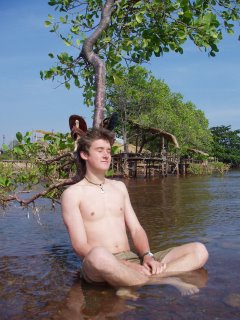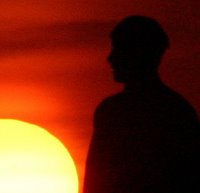King's Island

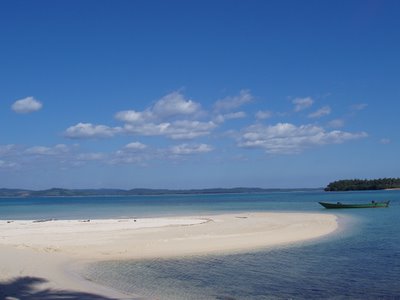
Thunk! A green coconut lands heavily at my feet, splashing white sand onto the hammock I’m rigging in the shade of two towering palms. Craning my neck and squinting upwards, I can make out the brown legs of Maran, a teenage fisherman who accepted $4 to ferry me across the channel to this putting-green sized atoll somewhere off the thickly forested coast of Southwestern Cambodia. Two more coconuts (whump, thomp) drop somewhere in the underbrush to my left. Abandoning my hammock for the moment, I hastily backpedal a few steps further into the grove to join Maran’s friend Kuhn on the porch of a driftwood shack, where he sits cross-legged, carefully twisting chicken feathers around a weighted wire hook to make a squid jig. Running my fingers across my scalp, I wonder for the umpteenth time where exactly I have managed to lose myself.
The idea to explore the scattered islands that lie between Sihanoukville, a beach town 150 km southwest of Phnom Penh, and the Thai border was, like most Cambodian projects, easy to put into motion but impossible to plan. Starting out, the only thing I knew with certainty was that the islands were out there somewhere beyond the sunset. The maps I checked agreed on the general position of two large islands at the eastern edge of the Gulf of Kompong Sohm, but each cartographer had apparently inserted a sampling from a different Jackson Pollack painting to represent the archipelago that lay beyond. How many islands there were, what they were shaped like, whether people lived on them and how it was possible to get there and away – the details, if you will – were a mystery that only grew foggier as I roamed about town searching for the informed sort of speculation.
“Yes, no problem,” said the first local I approached for information, pounding the backseat of his motorbike. Remembering my experience in Phnom Penh the week before, when, over the course of an afternoon spent looking for the Japanese embassy, I was dropped off in front of a brothel, outside a karaoke club and (close but no cigar), at the Lucky Sushi Bar, I hesitated before hopping on the bike.
“Islands,” I said, having long since abandoned my Khmer phrasebook in favor of exaggerated gestures and broken English. “Do you know where I can ask about a boat?”
“Islands, islands,” he replied, nodding enthusiastically and waving a hand in the direction of the Ecstatic Pizza Restaurant and Massage Parlor. “No problem, I know.”
He didn’t know, of course, but en route to whatever destination we were rumbling towards, I spotted a hand-lettered sign reading DIVE TRIPS. Leaving the bike and driver puttering at the curb, I ventured inside and found a deeply tanned old man with long white hair pulled back in a neat ponytail standing against the back wall gazing at a nautical chart of the Eastern Mediterranean.
Henri had nothing to do with any dive shop, but he had sailed around the world twice in his youth, and more applicable to my quest, had seen the islands I was searching for.
“There is a boat, you see,” he told me, searching carefully for the English words. “Between this town and the Thai border. It is popular with the travelers. I have taken it twice, and both times we made a stop at an island, perhaps off the headland, perhaps further along. There was a small village. I did not get off, but it seems to me that you could do so without trouble. But my memory is not so good and I am drinking absinthe since yesterday, so perhaps you should make certain at the ferry docks in the morning.”
Somewhat skeptically, I thanked Henri and motored back to my guesthouse, where the manager of the Endless Summer restaurant confirmed that the boat to the Thai border did exist, although he had never heard of it making a stop anywhere. Figuring that at worst the ride would give me a chance to scout the archipelago firsthand, I purchased a ticket and soon found myself squeezed between four Canadian women, a hung-over Cambodian fisherman, eight sacks of rice and a clump of extremely unhappy chickens on the roof of a narrow riverboat as it chugged across the harbor and into the open waters of the Gulf of Thailand.
As we rounded the cape that separates Sihanoukville from the Gulf of Kompong Sohm, I suddenly understood the mapmakers’ dilemma. Islands were scattered about in all directions as far as the eye could see – some big and mountainous, others barely more than sandy reefs protruding from the gentle waves, each and every one calling out for exploration. The boat splashed along through a shallow channel separating two islands that I nicknamed Jekyll and Hyde, one a morass of steamy green jungle and rocky cliffs, the other offering an empty white sand beach backed by coconut palms and banana plantations. A few fishing huts were tucked into quiet bays on this peaceful island, but few others betrayed any hint of a human presence. Even the mainland, visible in snatches where the chain of islands parted, showed no trace of road-dust or power-line scars in a verdant forest canopy smothering the rounded hills.
After two hours, with the noon sun reflecting hard off the boat’s white roof, it became nearly impossible to tell the difference between bay and channel and between island and coast; where one patch of sand ended and another began. I was watching dolphins romp in the bow wake when suddenly, a sign of civilization intruded upon the sublime - a red and white radio tower protruding from a nondescript atoll scarcely wider than an interstate highway. Peering over the bow, I could make out a cluster of tin roofs hugging the coast at the base of the tower. As we drew closer, two crewmen began throwing chickens and rice onto the lower deck. The Canadian women had their guidebook out and were frantically scanning the horizon for Thailand. Amidst the flurry of activity, I jumped over the rail and unto a rickety dock extending back into a warren of wooden shacks perched on stilts above the shallow little harbor. With a belch of black smoke and one or two feeble chicken squawks, the boat was suddenly gone, leaving a vague scent of sunscreen and paint lingering in the salty air.
Here I was.
Wherever that might be.
My presence on the dock of the fishing village had not gone unnoticed, but the frantic swarm of moto-drivers, fruit vendors and beggars that greet travelers at arrival points in most Cambodian towns failed to appear. Instead, the three wiry young men who had met the boat flashed white smiles and went back to sorting through cases of foodstuffs, while one dark-eyed little girl ducked out from behind a doorway to shout, “Hello.”
Most of the village existed on the docks themselves,
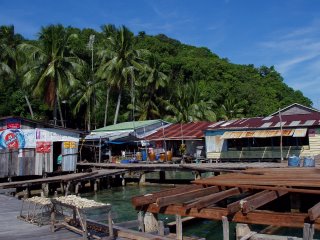 houses connected by a maze of weathered planks snaking this way and that a few feet above the quiet waves. Walking towards shore, I passed by general stores and brightly decorated teashops with tables in the shade. The main street was swept clean and overhung with bright pink bougainvillea blossoms. Like nearly everything on the island, it had a calming sort of logic about it, a sort of timeless appropriateness. Where else to put a street but here, between the docks and the hillside, where people had always walked and would tomorrow too?
houses connected by a maze of weathered planks snaking this way and that a few feet above the quiet waves. Walking towards shore, I passed by general stores and brightly decorated teashops with tables in the shade. The main street was swept clean and overhung with bright pink bougainvillea blossoms. Like nearly everything on the island, it had a calming sort of logic about it, a sort of timeless appropriateness. Where else to put a street but here, between the docks and the hillside, where people had always walked and would tomorrow too? There was a sense of wholesome vitality in this village, a quality hard to find in war-ravaged Cambodia. The people gossiping over fresh loafs of bread and baskets of papayas in the marketplace were poor, but not desperate; there was no aching look of frustrated urgency in the eyes of the men sorting through goods brought by the morning boat. I walked very slowly down the sun-splashed little street, soaking in the easy sense of calm that can only come from being in a place where no one expects more from tomorrow than they have today.
A gust of wind came off the sea, shaking loose a few pink blossoms and sending a gang of little boys running barefoot after their volleyball.
Later that evening, after a group of children checked me into an airy room with clean sheets at a guesthouse on the hill above town, I found a path to the shore and settled in to watch the sunset.
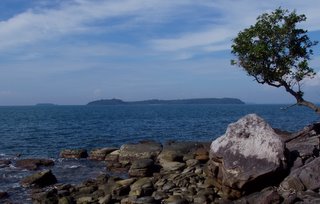 A sailor shipwrecked on this side of the island would assume it was uninhabited. Patches of tide-swept sand filled the gaps between jumbles of rock smoothed by millennia of waves, while trees fought voraciously for sunlight on the steep hillside behind the beach, their highest branches heavy with a plethora of colorful fruits. I entertained the idea of climbing up to pick some before realizing that if I fell, no one would know where to look for me. For that matter, even I didn’t have the slightest idea what this island was called or how to find it on a map. The last entry in the guesthouse registry was from two years ago. As the light turned orange, I forgot to wonder where I was and gazed off at other islands beckoning from across the waves.
A sailor shipwrecked on this side of the island would assume it was uninhabited. Patches of tide-swept sand filled the gaps between jumbles of rock smoothed by millennia of waves, while trees fought voraciously for sunlight on the steep hillside behind the beach, their highest branches heavy with a plethora of colorful fruits. I entertained the idea of climbing up to pick some before realizing that if I fell, no one would know where to look for me. For that matter, even I didn’t have the slightest idea what this island was called or how to find it on a map. The last entry in the guesthouse registry was from two years ago. As the light turned orange, I forgot to wonder where I was and gazed off at other islands beckoning from across the waves. The next morning I awoke early to the shouts of children playing soccer among the palms. As I walked down the hill to the market for breakfast, a man puttered by on a new motorbike, smiling as if he owned the world. A golden emblem on a thick necklace bounced against his healthy stomach where his shirt parted to the breeze. A well-groomed Pomeranian stood on the man’s lap with its front paws resting on the handlebars. It showed me little white teeth as its owner drove past.
Down in the village I bought a plateful of sweet potato fries and a ripe mango that a little girl expertly sliced with a flourish of her machete. While buying the food, my eyes were drawn to a round-faced young woman with long dark hair who was sitting behind a sugar cane juice stand in the shade of bougainvillea blossoms. Weighing the potential vulnerablities of my stomach and heart, I brought my food to her table.
The long-haired beauty hid a smile as passer-bys shared a laugh over her proximity to a foreigner. Without looking at me once, she took some fresh stalks of sugarcane from the pile at her feet and began feeding them into a metal grinder that she turned by hand.
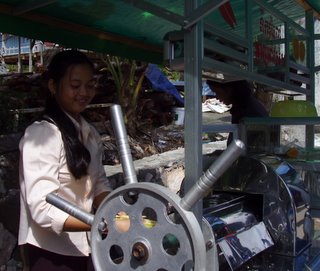 When the stalks were dry, she carefully brushed the dirt from a block of ice and chiseled off enough chips to fill a small plastic bag. Finally, she ladled the pale green juice over the ice, dropped in a straw and handed me the bag.
When the stalks were dry, she carefully brushed the dirt from a block of ice and chiseled off enough chips to fill a small plastic bag. Finally, she ladled the pale green juice over the ice, dropped in a straw and handed me the bag. “What?” I asked in my best Khmer, pointing at the drink. “What is this?”
The beautiful girl looked at me as if I was morphing into a snake, then broke into a smile, turned away and finally, looking back for just an instant with hair in her eyes, said, “T’uk m paao.”
“I like T’uk m paao,” I replied with a big smile, exhausting my Khmer vocabulary, but she just blushed into her shirt collar and started cleaning the juice grinder. I turned my attention to the crowd of children who had solemnly surrounded my table.
Shyness disappeared in no time. The kids showed me that they could count to ten in English, I taught them how to play ‘Rock, Paper, Scissors,’ we confirmed that everyone liked T’uk m paao, and then the whole crowd pulled me away from the table and deposited me with shouts of glee on the hard-packed dirt of the town volley-ball court. After much frenzied and physical Rock, Paper, Scissors, three boys small enough to run under the net without ducking joined me on the court while the rest lined up on the sidelines. My partner gave me a thumbs up and tossed over a ball. I could feel dark eyes watching from behind the juice grinder as got ready to serve.
Thirty minutes later, red of face, pouring sweat and thoroughly embarrassed at getting my ass handed to me by a pack of six year olds, I shuffled back to the table in the shade. Figuring that the dignity I had just lost on the court could be partially salvaged by a display of generosity, I called the kids together and ordered T’uk m paao all around. It was there, surrounded by jubilant hordes of sugared-up elementary schoolers, that Mr. Ken So Khut found me.
Ken arrived on the back of a motor scooter, a slight, dark-skinned man of about forty with floppy hair, threadbare clothes and a wry sense of humor. “Oh shit man,” he said, catching my eye with a doleful expression. “Let’s get you out of here.”
He brought me on the back of the scooter to a quiet tea house near the ferry dock where we ordered cold sweet tea and a plate of spicy pickled vegetables. Thankful to be out of the heat and for a chance to speak English, I bombarded Ken with questions.
“About 300 families live here,” he explained. “Fishermen, for the most part. I came here from Phonm Penh to work for tourists but nobody comes. You’re the first I’ve had in almost a year.” He laughed a little sadly, fingering his shirt.
“What did you do in Phonm Penh?”
“I was a kickboxer,” Ken replied, his eyes brightening up. “274 fights. Then I studied English but I had no money so I drove a moto-bike. Then I came here. Six years ago.”
“I saw a man this morning,” I said, “riding a bike with a little dog. Is he a fisherman?”
Ken laughed.
“Ah, you mean Oueng. He owns everything here, the ice factory, the shops, the restaurant, all the fish - even the guest-house where you’re staying. He’s from Thailand, got lots of money.”
“How can he own the fish,” I asked, confused. “Isn’t almost everyone a fisherman?”
“Yeah, but how can they sell the fish without using Oueng’s ice? He buys everything and ships it off to Thailand. Thai boats come in too, right off there, they come in at night and shine the big lights into the water and all the fish come to the light and they scoop them out and go home. There’s no more fish here now. The local people can’t keep up. They have to go far out at night now too. It’s dangerous in those little boats but the price of gas is high and there’s not enough fish to cover expenses if you just work the daytime. They need something new, new jobs, but there’s nothing else. Two more years and Oueng will go back to Thailand and these people won’t even be able to buy rice. We need tourists to come. We're dying for tourists to come. Say, do you want to explore some islands with a fisherman tomorrow? You would be their first tourist!”
The first tourist. The first syphilictic penetration. I thought of the girl on the beach in Sihanoukville who only knew the Japanese words for hello, thank you, hard and painful. And then I thought of those beautiful islands across the channel.
"Sure," I said to Ken. "I'd love to."
His face split into a grin. "Thanks. They'll be so happy. It will make a big difference for them."
The boat waiting for me at the docks the next morning was a long narrow canoe with a thick coat of red paint, powered
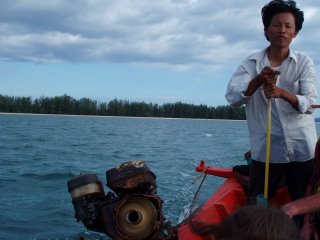 by a motor that that looked like it had been salvaged from an old weed-whacker. Ken acted businesslike, shouting instructions to Maran, the bemused young fisherman at the helm. At the last minute, another young fisherman joined us in the bow, and as Ken tossed over the mooring line Maran casually started the motor a-whirring and piloted us out into open water.
by a motor that that looked like it had been salvaged from an old weed-whacker. Ken acted businesslike, shouting instructions to Maran, the bemused young fisherman at the helm. At the last minute, another young fisherman joined us in the bow, and as Ken tossed over the mooring line Maran casually started the motor a-whirring and piloted us out into open water. Islands were scattered about in a loose ring surrounding a shallow bay, backed to the East by the Cardamom Mountains, a roadless wilderness nonetheless bearing fresh red scars from recent clearcuts. Schools of silver fish broke water in shimmering, panicky waves as our boat cut through the gentle currents. Not sure if the crew had a destination in mind, I pointed to a tiny atoll with a small hut surrounded by a grove of lofty palms. Maran nodded, cutting the engine as we drew closer and letting the nose of our craft nudge up a perfect curve of sand.
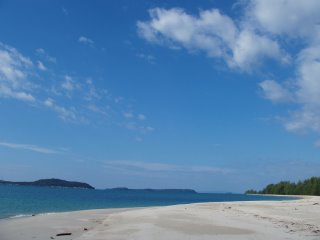 We spent the whole day in this manner, with me gesturing towards beach after beach, Maran guiding us in and the two fishermen killing time by foraging for tropical fruit or casting handlines while I poked around, swam and relaxed. The islands were overflowing with voracious life - ghostly transparent crabs scuttling about on the tideline, huge red starfish in the shallows, giant clamshells too heavy for one person to lift and coconuts littered about in the shade of airy groves. I felt like Captain Cook.
We spent the whole day in this manner, with me gesturing towards beach after beach, Maran guiding us in and the two fishermen killing time by foraging for tropical fruit or casting handlines while I poked around, swam and relaxed. The islands were overflowing with voracious life - ghostly transparent crabs scuttling about on the tideline, huge red starfish in the shallows, giant clamshells too heavy for one person to lift and coconuts littered about in the shade of airy groves. I felt like Captain Cook.Ken met the boat on the docks and exchanged a burst of Khmer with Maran. "He wonders if you had a good time. And do you want to come hear his band play tonight?"
"A great time," I replied. "I'll be there."
Ken came up to the guesthouse to meet me that night, and we motored down to the docks on his bike. The street was quieter now, people resting in hammocks and crouched over cooking fires, the flickering glow of candles, soft conversation. He turned off the street and slowly maneuvered the bike through the wooden alleyways, ducking low under tinroofs and emerging at last onto the concrete expanse of the fishing docks where Maran and his friends were gathered around a small generator. Maran came over to say hello, smiling shyly, while his bandmates plugged in amps and arranged microphones. I sat down with Ken on some plastic crates and sipped a glass of Coke poured by a teenage girl who couldn't stop herself from giggling.
The band took their places, lovingly holding worn instruments. The lead singer, another young fisherman, had high cheekbones, a wide nose and deep dark eyes - a face from another time - and when the guitar kicked in and the drummer slammed away he started jumping in place and singing urgently, fast and hard. The music rolled around the docks, drawing Mr. Oeung out of his restaurant, patting his belly, pulling in a crowd of excited little boys, eyes shining, their mothers and fathers too, everyone clapping, and then beautiful young women riding four to a motorbike who immediately started dancing while their brothers hung back shyly and watched from the edges of the crowd. Ken jumped up and pulled me into the middle of the circle, dancing at me like a kickboxer as the band launched into a rollicking Khmer folksong, the notes carrying far out over the dark and empty waves. When it was over, with everyone walking off to bed a a little sweaty and a little euphoric, Ken and I bumped back up the hill through silence that rang.

"I have to leave tomorrow," I told him. "I'll come back, but tomorrow I have to leave."
"At least you came."
The next morning the boat from Sihanoukville pulled in and I found a spot on the roof between a redfaced man from Liverpool who was trying to convince two sunburned college girls to join him to for the New Years in Pattaya. I played rock paper scissors with the kid's on the dock.
"You just come from there? How was it then?"
The Englishman had turned his attention away from the girls for a moment.
"It was beautiful," I told him. "I wanted to stay."
"Yeah? Doesn't look like much. What's the place called anyway?"
I didn't know. The boat was pulling away.
"Ken!" I yelled. "Ken, what's the name of this island!"
He cupped his hands around his mouth and shouted over the groaning diesel engines.
"You don't know! It's Koh S'dach!"
"It's what?"
"It's King's Island! It's the island of Kings!"
And then I couldn't hear him anymore and we waved at each other and the little boys made fists and flat hands and chopping fingers until we were out of sight and laboring on through the islands towards Thailand.




